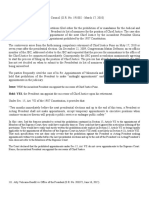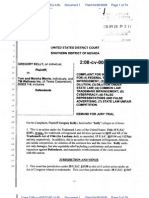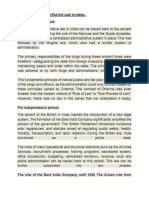0 ratings0% found this document useful (0 votes)
563 viewsFlores v. Drilon
Flores v. Drilon
Uploaded by
Noreenesse SantosThe Supreme Court ruled that the provision in the law appointing the Mayor of Olongapo City as Chairman and CEO of the Subic Bay Metropolitan Authority violates the constitution. The constitution prohibits the appointment of elective officials to other government posts during their term. While the Mayor's actions as de facto SBMA official are valid, his actual appointment is null and void. The court declared the provision unconstitutional but allowed the Mayor to retain any benefits received from the invalid appointment.
Copyright:
© All Rights Reserved
Available Formats
Download as PDF, TXT or read online from Scribd
Flores v. Drilon
Flores v. Drilon
Uploaded by
Noreenesse Santos0 ratings0% found this document useful (0 votes)
563 views2 pagesThe Supreme Court ruled that the provision in the law appointing the Mayor of Olongapo City as Chairman and CEO of the Subic Bay Metropolitan Authority violates the constitution. The constitution prohibits the appointment of elective officials to other government posts during their term. While the Mayor's actions as de facto SBMA official are valid, his actual appointment is null and void. The court declared the provision unconstitutional but allowed the Mayor to retain any benefits received from the invalid appointment.
Original Description:
Case Digest
Copyright
© © All Rights Reserved
Available Formats
PDF, TXT or read online from Scribd
Share this document
Did you find this document useful?
Is this content inappropriate?
The Supreme Court ruled that the provision in the law appointing the Mayor of Olongapo City as Chairman and CEO of the Subic Bay Metropolitan Authority violates the constitution. The constitution prohibits the appointment of elective officials to other government posts during their term. While the Mayor's actions as de facto SBMA official are valid, his actual appointment is null and void. The court declared the provision unconstitutional but allowed the Mayor to retain any benefits received from the invalid appointment.
Copyright:
© All Rights Reserved
Available Formats
Download as PDF, TXT or read online from Scribd
Download as pdf or txt
0 ratings0% found this document useful (0 votes)
563 views2 pagesFlores v. Drilon
Flores v. Drilon
Uploaded by
Noreenesse SantosThe Supreme Court ruled that the provision in the law appointing the Mayor of Olongapo City as Chairman and CEO of the Subic Bay Metropolitan Authority violates the constitution. The constitution prohibits the appointment of elective officials to other government posts during their term. While the Mayor's actions as de facto SBMA official are valid, his actual appointment is null and void. The court declared the provision unconstitutional but allowed the Mayor to retain any benefits received from the invalid appointment.
Copyright:
© All Rights Reserved
Available Formats
Download as PDF, TXT or read online from Scribd
Download as pdf or txt
You are on page 1of 2
ADMIN LAW LOCAL OFFICIALS - PROHIBITION AGAINST APPOINTMENT
Title: Flores v. Drilon G.R. No. 104732
Date: June 22, 1993
Ponente: Bellosillo, J.
ROBERTO A. FLORES, DANIEL Y. FIGUEROA, ROGELIO T.
HON. FRANKLIN M. DRILON, Executive Secretary, and
PALO, DOMINGO A. JADLOC, CARLITO T. CRUZ and
RICHARD J. GORDON,
MANUEL P. REYES,
respondents
petitioners
FACTS
Petitioners, taxpayers and employees of U.S facilities at Subic, challenge the constitutionality of Sec. 13, par. (d), of
R.A. 7227, otherwise known as the "Bases Conversion and Development Act of 1992," under which respondent Mayor
Richard J. Gordon of Olongapo City was appointed Chairman and Chief Executive Officer of the Subic Bay Metropolitan
Authority (SBMA), is challenged in this case. Paragraph (d) reads:
o (d) Chairman administrator - The President shall appoint a professional manager as administrator of the Subic
Authority with a compensation to be determined by the Board subject to the approval of the Secretary of Budget,
who shall be the ex oficio chairman of the Board and who shall serve as the chief executive officer of the Subic
Authority: Provided, however, That for the first year of its operations from the effectivity of this Act, the mayor of
the City of Olongapo shall be appointed as the chairman and chief executive officer of the Subic Authority.
ISSUE/S
1. Whether the proviso violates the constitutional proscription against appointment or designation of elective officials to
other government posts. YES
2. Whether or not the SBMA posts are merely ex officio to the position of Mayor of Olongapo City and thus an excepted
circumstance. NO
3. Whether or not the Constitutional provision allowing an elective official to receive double compensation (Sec. 8, Art. IX-
B) would be useless if no elective official may be appointed to another post. NO
4. Whether there is legislative encroachment on the appointing authority of the President. YES
5. Whether Mayor Gordon may retain any and all per diems, allowances and other emoluments which he may have
received pursuant to his appointment. YES
RATIO
It is argued that Sec. 94 of the Local Government Code (LGC) permits the appointment of a local elective official to
another post if so allowed by law or by the primary functions of his office. But, the contention is fallacious. Section 94
of the LGC is not determinative of the constitutionality of Sec. 13, par. (d), of R.A. 7227, for no legislative act can prevail
over the fundamental law of the land. Moreover, since the constitutionality of Sec. 94 of LGC is not the issue here nor
is that section sought to be declared unconstitutional, we need not rule on its validity. Neither can we invoke a practice
otherwise unconstitutional as authority for its validity.
In any case, the view that an elective official may be appointed to another post if allowed by law or by the primary
functions of his office, ignores the clear-out difference in the wording of the two (2) paragraphs of Sec. 7, Art. IX-B, of
the Constitution. While the second paragraph authorizes holding of multiple offices by an appointive official when
allowed by law or by the primary functions of his position, the first paragraph appears to be more stringent by not
providing any exception to the rule against appointment or designation of an elective official to other government
posts, except as are particularly recognized in the Constitution itself, e.g., the President as head of the economic and
planning agency; the Vice-President, who may be appointed Member of the Cabinet; and, a member of Congress who
may be designated ex officio member of the Judicial and Bar Council.
Sec. 7 of Art. IX-B of the Constitution provides: “No elective official shall be eligible for appointment or designation in
any capacity to any public office or position during his tenure. Unless otherwise allowed by law or by the primary
functions of his position, no appointive official shall hold any other office or employment in the Government or any
subdivision, agency or instrumentality thereof, including government-owned or controlled corporations or their
subsidiaries.” The subject proviso directs the President to appoint an elective official i.e. the Mayor of Olongapo City,
to other government post (as Chairman and CEO of SBMA). This is precisely what the Constitution prohibits. It seeks
to prevent a situation where a local elective official will work for his appointment in an executive position in
government, and thus neglect his constitutents.
Congress did not contemplate making the SBMA posts as automatically attached to the Office of the Mayor without
need of appointment. The phrase “shall be appointed” unquestionably shows the intent to make the SBMA posts
appointive and not merely adjunct to the post of Mayor of Olongapo City.
Sec. 8, Art. IX-B does not affect the constitutionality of the subject proviso. In any case, the Vice-President for example,
an elective official who may be appointed to a cabinet post, may receive the compensation attached to the cabinet
position under Sec. 3, Art. VII if specifically authorized by law.
Although Section 13(d) itself vests in the President the power to appoint the Chairman of SBMA, he really has no
choice but to appoint the Mayor of Olongapo City. The power of choice is the heart of the power to appoint.
Appointment involves an exercise of discretion of whom to appoint. Hence, when Congress clothes the President with
the power to appoint an officer, it cannot at the same time limit the choice of the President to only one candidate.
Such enactment effectively eliminates the discretion of the appointing power to choose and constitutes an irregular
restriction on the power of appointment. While it may be viewed that the proviso merely sets the qualifications of the
officer during the first year of operations of SBMA, i.e., he must be the Mayor of Olongapo City, it is manifestly an
abuse of congressional authority to prescribe qualifications where only one, and no other, can qualify. Since the
ineligibility of an elective official for appointment remains all throughout his tenure or during his incumbency, he may
however resign first from his elective post to cast off the constitutionally-attached disqualification before he may be
considered fit for appointment. Consequently, as long as he is an incumbent, an elective official remains ineligible for
appointment to another public office.
As incumbent elective official, Gordon is ineligible for appointment to the position of Chairman and CEO of SBMA;
hence, his appointment thereto cannot be sustained. He however remains Mayor of Olongapo City, and his acts as
SBMA official are not necessarily null and void; he may be considered a de facto officer, and in accordance with
jurisprudence, is entitled to such benefits.
RULING
WHEREFORE, the proviso in par. (d), Sec. 13, of R.A. 7227, which states: ". . . Provided, however, That for the first year
of its operations from the effectivity of this Act, the Mayor of the City of Olongapo shall be appointed as the chairman
and chief executive officer of the Subic Authority," is declared unconstitutional; consequently, the appointment pursuant
thereto of the Mayor of Olongapo City, respondent Richard J. Gordon, is INVALID, hence NULL and VOID.
However, all per diems, allowances and other emoluments received by respondent Gordon, if any, as such Chairman
and Chief Executive Officer may be retained by him, and all acts otherwise legitimate done by him in the exercise of his
authority as officer de facto of SBMA are hereby UPHELD.
(SANTOS, 2B 2017-2018)
You might also like
- Design Build ContractDocument8 pagesDesign Build Contractcabornida.ccicascNo ratings yet
- Steve Bresnen: To: Interested PartiesDocument12 pagesSteve Bresnen: To: Interested PartiesYvonne LarsenNo ratings yet
- Carpio Morales v. CADocument3 pagesCarpio Morales v. CAAnj100% (5)
- Digest - G.R. No. 86344 Daza Vs Singson 180 SCRA 496 (Judicial Power, Justiciable Controversy)Document2 pagesDigest - G.R. No. 86344 Daza Vs Singson 180 SCRA 496 (Judicial Power, Justiciable Controversy)Mark100% (3)
- The Province of North Cotabato v. The Gov. of The Republic of The Phils. Peace PanelDocument4 pagesThe Province of North Cotabato v. The Gov. of The Republic of The Phils. Peace PanelNoreenesse SantosNo ratings yet
- Sec. 15 Midnight AppointmentsDocument3 pagesSec. 15 Midnight AppointmentsDawn Jessa GoNo ratings yet
- Codilla Vs de Venecia (2002)Document4 pagesCodilla Vs de Venecia (2002)xxxaaxxxNo ratings yet
- Consti Case Gonzales III V Office of The President, 714 SCRA 611 GR 196231 and 196232Document4 pagesConsti Case Gonzales III V Office of The President, 714 SCRA 611 GR 196231 and 196232Lu Cas100% (3)
- Province of Batangas v. RomuloDocument4 pagesProvince of Batangas v. RomuloNoreenesse Santos100% (4)
- GR No. 189793 SEn. Aquino Vs COMELECDocument2 pagesGR No. 189793 SEn. Aquino Vs COMELECChristopher Advincula100% (6)
- Matibag vs. Benipayo - DigestDocument5 pagesMatibag vs. Benipayo - DigestRoxanne Peña100% (1)
- Province of Batangas Vs RomuloDocument2 pagesProvince of Batangas Vs RomuloCelinka Chun100% (4)
- Tan vs. COMELEC DigestDocument2 pagesTan vs. COMELEC DigestKeilah Arguelles100% (3)
- Farinas VS ExecDocument2 pagesFarinas VS ExecVanityHugh100% (2)
- Province of Batangas v. RomuloDocument4 pagesProvince of Batangas v. RomuloNoreenesse Santos100% (4)
- 20.EILR - Smolin.overcoming Religious ObjectionsDocument30 pages20.EILR - Smolin.overcoming Religious ObjectionsKochmeNo ratings yet
- Original Registration 13 Steps - Land TitlesDocument42 pagesOriginal Registration 13 Steps - Land TitlesBoy Kakak Toki100% (14)
- G.R. No. 104732 - June 22, 1993: Flores V. DrilonDocument2 pagesG.R. No. 104732 - June 22, 1993: Flores V. DrilonCarlota Nicolas VillaromanNo ratings yet
- Flores V DrilonDocument1 pageFlores V DrilonLuz Celine CabadingNo ratings yet
- Flores vs. DrilonDocument2 pagesFlores vs. DrilonChristian Roque100% (1)
- Abundo Sr. V COMELEC G.R. No. 201716 2013Document3 pagesAbundo Sr. V COMELEC G.R. No. 201716 2013John SolivenNo ratings yet
- Abundo, Sr. V Comelec GR No. 201716Document2 pagesAbundo, Sr. V Comelec GR No. 201716Adfat Pandan100% (2)
- Case Digest - Villegas Vs SubidoDocument3 pagesCase Digest - Villegas Vs SubidoVic RabayaNo ratings yet
- Dadole vs. COA, G.R. No. 125350Document4 pagesDadole vs. COA, G.R. No. 125350Roward100% (2)
- 018 Joson v. Torres (Tamayo)Document2 pages018 Joson v. Torres (Tamayo)BenBulacNo ratings yet
- Disomangcop v. DatumanongDocument4 pagesDisomangcop v. DatumanongNoreenesse SantosNo ratings yet
- GONZALES III Vs Office of The President (Poli Case)Document8 pagesGONZALES III Vs Office of The President (Poli Case)Rio DizonNo ratings yet
- Gloria V CADocument2 pagesGloria V CAGia Dimayuga50% (2)
- 14 Pichay, Jr. vs. Office of The Deputy Executive Secretary For Legal Affairs-Investigative and Adjudicatory DivisionDocument3 pages14 Pichay, Jr. vs. Office of The Deputy Executive Secretary For Legal Affairs-Investigative and Adjudicatory DivisionRem SerranoNo ratings yet
- 7 Farinas V Barba DigestDocument2 pages7 Farinas V Barba DigestBea Crisostomo100% (2)
- Datu Michael Abas Kida Vs Senate of The PhilippinesDocument2 pagesDatu Michael Abas Kida Vs Senate of The PhilippinesSophia Seo100% (5)
- Calderon vs. Carale Case DigestDocument2 pagesCalderon vs. Carale Case DigestCharmaine Mejia100% (1)
- Joson V TorresDocument2 pagesJoson V TorresMaureen Co50% (2)
- Bankers Association of The Philippines Vs ComelecDocument1 pageBankers Association of The Philippines Vs Comelecmei_2208100% (1)
- Review Center Association v. ErmitaDocument3 pagesReview Center Association v. ErmitaJustin Moreto100% (3)
- Pimentel Vs Ermita Case DigestDocument2 pagesPimentel Vs Ermita Case DigestJessamine Orioque100% (6)
- Abundo vs. ComelecDocument2 pagesAbundo vs. Comelecasg_jingNo ratings yet
- Evardone v. Comelec, 204 SCRA 464, 472Document1 pageEvardone v. Comelec, 204 SCRA 464, 472m_oailNo ratings yet
- Career Executive Service Board Vs CSCDocument3 pagesCareer Executive Service Board Vs CSCSultan Kudarat State University100% (3)
- 350 SCRA 732 - Bito-Onon Vs FernandezDocument5 pages350 SCRA 732 - Bito-Onon Vs FernandezFran SuarezNo ratings yet
- Mendoza V Laxina Digest For Admin LawDocument1 pageMendoza V Laxina Digest For Admin LawchaynagirlNo ratings yet
- Digest Dayao V ComelecDocument2 pagesDigest Dayao V ComelecFred Michael L. Go67% (3)
- Dimaporo Vs Mitra JR DigestDocument2 pagesDimaporo Vs Mitra JR DigestMarc Dave AlcardeNo ratings yet
- Joson Vs Executive Secretary, 290 SCRA 279 Case Digest (Administrative Law)Document2 pagesJoson Vs Executive Secretary, 290 SCRA 279 Case Digest (Administrative Law)AizaFerrerEbina100% (2)
- Rufino Vs EndrigaDocument1 pageRufino Vs EndrigaOtep Belciña Lumabas80% (5)
- Law and Custom - Lloyd (Chapter 10) NotesDocument3 pagesLaw and Custom - Lloyd (Chapter 10) NotesShannin MaeNo ratings yet
- Arturo M de Castro Vs Judicial and Bar Council (JBC) 615 SCRA 666Document4 pagesArturo M de Castro Vs Judicial and Bar Council (JBC) 615 SCRA 666Josh CabreraNo ratings yet
- Lacson V Romero Case DigestDocument1 pageLacson V Romero Case DigestReniel Dennis Ramos100% (2)
- Aquino III & Robredo Vs ComelecDocument3 pagesAquino III & Robredo Vs ComelecEva Trinidad100% (4)
- Navarro vs. CA - PubcorpdigestDocument2 pagesNavarro vs. CA - PubcorpdigestLou Angelique HeruelaNo ratings yet
- Solicitor General Vs Metropolitan Manila AuthorityDocument2 pagesSolicitor General Vs Metropolitan Manila AuthorityTricia Sibal100% (1)
- Baguilat vs. Alvarez DigestDocument1 pageBaguilat vs. Alvarez DigestAli80% (5)
- Mariano JR Vs Comelec 242 Scra 211Document2 pagesMariano JR Vs Comelec 242 Scra 211Myco MemoNo ratings yet
- GR No. 166715 (2008) - Abakada v. PurisimaDocument3 pagesGR No. 166715 (2008) - Abakada v. PurisimaNikki Estores Gonzales100% (3)
- Digest of Tuanda v. An (G.R. No. 110544)Document1 pageDigest of Tuanda v. An (G.R. No. 110544)Rafael Pangilinan100% (1)
- Tallado VS ComelecDocument2 pagesTallado VS ComelecMarvielyn Joy Ello75% (4)
- Luego v. CSC DigestDocument3 pagesLuego v. CSC Digestkathrynmaydeveza100% (1)
- Jelicaria-Garafil vs. Op - ExecutiveDocument2 pagesJelicaria-Garafil vs. Op - ExecutiveFritzie G. PuctiyaoNo ratings yet
- Fortich Vs CoronaDocument3 pagesFortich Vs CoronaRaymond RoqueNo ratings yet
- Magallona v. ErmitaDocument3 pagesMagallona v. ErmitaAbbyElbamboNo ratings yet
- Alvarez Vs GuingonaDocument3 pagesAlvarez Vs GuingonaRaymond Roque100% (1)
- Career Exec Board Vs CSCDocument3 pagesCareer Exec Board Vs CSCPJANo ratings yet
- Alvarez V Guingona DigestDocument4 pagesAlvarez V Guingona DigestJamiah Hulipas75% (4)
- Digets Flores Vs DrilonDocument2 pagesDigets Flores Vs DrilonZel FerrerNo ratings yet
- Flores v. DrilonDocument3 pagesFlores v. DrilonJoni AquinoNo ratings yet
- Flores vs. Drilon Public OfficeDocument2 pagesFlores vs. Drilon Public OfficeKeilah ArguellesNo ratings yet
- Talaga v. Commission On ElectionsDocument3 pagesTalaga v. Commission On ElectionsNoreenesse SantosNo ratings yet
- Tan v. Commission On ElectionsDocument3 pagesTan v. Commission On ElectionsNoreenesse SantosNo ratings yet
- Tano v. SocratesDocument3 pagesTano v. SocratesNoreenesse SantosNo ratings yet
- White Light Corp. v. City of ManilaDocument3 pagesWhite Light Corp. v. City of ManilaNoreenesse SantosNo ratings yet
- Sema v. Commission On ElectionsDocument4 pagesSema v. Commission On ElectionsNoreenesse SantosNo ratings yet
- Social Justice Society v. Atienza, Jr.Document5 pagesSocial Justice Society v. Atienza, Jr.Noreenesse Santos100% (1)
- Sangalang v. Intermediate Appellate CourtDocument4 pagesSangalang v. Intermediate Appellate CourtNoreenesse Santos100% (1)
- Samson v. AguirreDocument2 pagesSamson v. AguirreNoreenesse Santos100% (1)
- Socrates v. Commission On ElectionsDocument3 pagesSocrates v. Commission On ElectionsNoreenesse SantosNo ratings yet
- Rivera III v. Commission On ElectionsDocument1 pageRivera III v. Commission On ElectionsNoreenesse SantosNo ratings yet
- Samahan NG Mga Progresibong Kabataan v. Quezon City PDFDocument4 pagesSamahan NG Mga Progresibong Kabataan v. Quezon City PDFNoreenesse Santos100% (6)
- Republic v. Court of AppealsDocument3 pagesRepublic v. Court of AppealsNoreenesse SantosNo ratings yet
- Mendoza v. Commission On ElectionsDocument2 pagesMendoza v. Commission On ElectionsNoreenesse SantosNo ratings yet
- Republic v. RambuyongDocument1 pageRepublic v. RambuyongNoreenesse Santos100% (2)
- Philippine Constitutional Framework For Economic Emergency - Expanding The Welfare State, Restricting The National Security (Raul C. Pangalangan)Document16 pagesPhilippine Constitutional Framework For Economic Emergency - Expanding The Welfare State, Restricting The National Security (Raul C. Pangalangan)Noreenesse SantosNo ratings yet
- Philippine Society For The Prevention of Cruelty To Animals v. Commission On Audit, Et Al.Document2 pagesPhilippine Society For The Prevention of Cruelty To Animals v. Commission On Audit, Et Al.Noreenesse SantosNo ratings yet
- Lina v. PanoDocument2 pagesLina v. PanoNoreenesse Santos100% (3)
- Jalosjos, Jr. v. Commission On ElectionsDocument3 pagesJalosjos, Jr. v. Commission On ElectionsNoreenesse SantosNo ratings yet
- Ong v. AlegreDocument2 pagesOng v. AlegreNoreenesse SantosNo ratings yet
- Kida v. Senate of The PhilippinesDocument7 pagesKida v. Senate of The PhilippinesNoreenesse SantosNo ratings yet
- SNBP International School & Kidzone: ACADEMIC SESSION:-2021-2022Document2 pagesSNBP International School & Kidzone: ACADEMIC SESSION:-2021-2022The Coding WorldNo ratings yet
- Chapter 7 - The Aircraft and Civil Aviation - Chapter 8 - Obligations of Carrier in Air Transportation - Chapter 9 - The Warsaw ConventionDocument41 pagesChapter 7 - The Aircraft and Civil Aviation - Chapter 8 - Obligations of Carrier in Air Transportation - Chapter 9 - The Warsaw ConventionAdrian KitNo ratings yet
- SAMPLE Contract of Employment For Managerial CategoriesDocument6 pagesSAMPLE Contract of Employment For Managerial CategoriesMaria Cristina ArcillaNo ratings yet
- Lecture 1 - General Concepts of Labor LawDocument4 pagesLecture 1 - General Concepts of Labor LawLove Jose ÜNo ratings yet
- Presentation On Income TaxDocument9 pagesPresentation On Income TaxUnnati GuptaNo ratings yet
- 2 Guaranteed Homes v. ValdezDocument2 pages2 Guaranteed Homes v. ValdezBananaNo ratings yet
- United States Court of Appeals, Fourth CircuitDocument2 pagesUnited States Court of Appeals, Fourth CircuitScribd Government DocsNo ratings yet
- Press Release (Florida) .03.03Document2 pagesPress Release (Florida) .03.03Eric LechtzinNo ratings yet
- Constitutional Law Chapter I - Fundamental Powers of The State (Police Power) - Philippine Law ReviewersDocument7 pagesConstitutional Law Chapter I - Fundamental Powers of The State (Police Power) - Philippine Law ReviewersSheilaNo ratings yet
- VOL. 354, MARCH 20, 2001 627: Acuña vs. AlcantaraDocument3 pagesVOL. 354, MARCH 20, 2001 627: Acuña vs. AlcantaraSharel LontocNo ratings yet
- Affidavit of GuardianshipDocument4 pagesAffidavit of GuardianshipSherwin HermanoNo ratings yet
- Motion Preliminary InjunctionDocument59 pagesMotion Preliminary InjunctionNEWS CENTER MaineNo ratings yet
- Singer Sewing Company Vs NLRC DigestDocument1 pageSinger Sewing Company Vs NLRC DigestALee BudNo ratings yet
- Didipio Earth Savers Multipurpose Association Et Al Vs DENR Sec Elisea Gozun Et AlDocument2 pagesDidipio Earth Savers Multipurpose Association Et Al Vs DENR Sec Elisea Gozun Et Alchey_anneNo ratings yet
- 2015icad MS22Document2 pages2015icad MS22Rajesh KarriNo ratings yet
- People v. Floresta y SelencioDocument6 pagesPeople v. Floresta y SelencioCassie GacottNo ratings yet
- Mike Crites BioDocument2 pagesMike Crites BiowmdtvmattNo ratings yet
- ISOFITNESSComplaint PDFDocument74 pagesISOFITNESSComplaint PDFRyan Gile, Esq.100% (2)
- Accountability of Public OfficersDocument35 pagesAccountability of Public OfficersConnie Sulang100% (2)
- Notice: Meetings: National Institute of Allergy and Infectious DiseasesDocument1 pageNotice: Meetings: National Institute of Allergy and Infectious DiseasesJustia.comNo ratings yet
- KP Forms Use in Cases 2019Document24 pagesKP Forms Use in Cases 2019Jackielou Aquino AvilesNo ratings yet
- Indian JudiciaryDocument9 pagesIndian JudiciaryJatin GuptaNo ratings yet
- 6313 eConsentForInstitute1770340Document3 pages6313 eConsentForInstitute1770340iN DesignsNo ratings yet
- Evolution of Adminstrative Law in IndiaDocument9 pagesEvolution of Adminstrative Law in IndiaPavan KumarNo ratings yet
- Navfac Labor Fact Sheet Nov2014Document3 pagesNavfac Labor Fact Sheet Nov2014Rubén García DíazNo ratings yet
- Certificate of Non-Forum Shopping - ImportanceDocument1 pageCertificate of Non-Forum Shopping - ImportanceDO SOLNo ratings yet














































































































